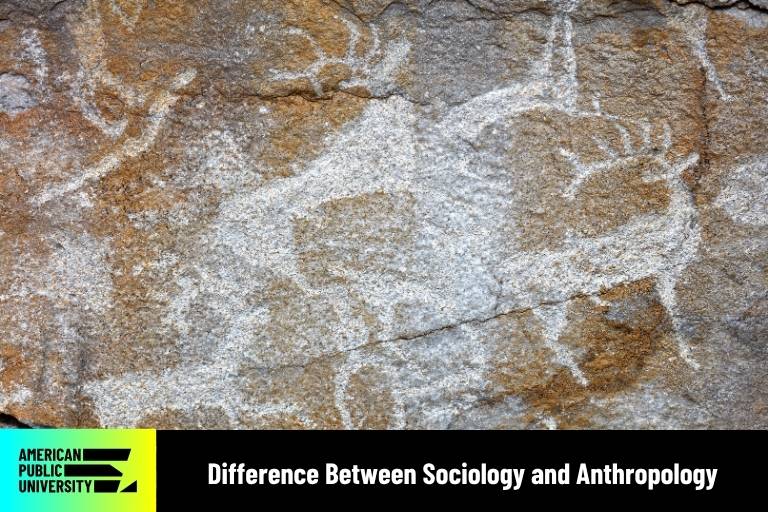07/29/2025

Exploring Two Social Sciences That Study Human Behavior
Sociology and anthropology are closely related disciplines within the social sciences. Each seeks to better understand the complexity of human life, but they approach the subject from different perspectives. Sociology tends to focus on current social structures, institutions, and interactions, while anthropology digs into the evolution of human societies, cultures, and behaviors, often through a more historical and comparative perspective.
So, what is the difference between sociology and anthropology? Understanding where these fields differ—and where they intersect—can help those interested in human society choose the path that best aligns with their interests and career goals.
Comparing Cultural Anthropology and Sociology
One of the most notable distinctions between the two lies in cultural anthropology. Cultural anthropologists often study human cultures through deep immersion and participant observation, looking to understand how different communities express beliefs and social practices. These studies often focus on diverse global communities, including those historically underrepresented in Western academic literature.
Sociologists, by contrast, typically examine social interactions, institutions, and group behavior in modern settings. Topics may include how factors such as race, gender, religion, or class influence individual experiences within larger systems, including education, family, or governance.
Biological and Linguistic Anthropology
Biological anthropology (also known as physical anthropology) explores the evolutionary aspects of human life, drawing from genetics and fossil analysis.
Linguistic anthropology looks at how language functions as a cultural tool. These scholars study how communication—verbal and non-verbal—shapes societies and identities across different communities.
Sociologists may examine language and health through social constructs, but rarely focus on biological or linguistic aspects in the same way as anthropologists.
Comparing Research Methods in Sociology and Anthropology
Both disciplines use qualitative and quantitative research, but with differing emphasis. Anthropology tends to rely on qualitative methods, such as fieldwork, interviews, and ethnography, to gain in-depth insight into lived experiences.
Sociology often incorporates quantitative tools, including large-scale surveys and statistical analysis, to examine behavioral trends or institutional outcomes. That said, both disciplines have increasingly adopted mixed-methods research, using both qualitative and quantitative data.
Students may want to consider which research approach best suits their academic goals.
Shared Focus on Human Experience
While sociology emphasizes modern societies, anthropology often looks across historical timeframes—including ancient civilizations and evolving cultural practices.
Though their scopes differ, both disciplines aim to uncover the complexities of human interaction and cultural development.
Where Disciplines Overlap: Cultural Sociology
Cultural sociology is a subfield of sociology that overlaps with anthropology. It examines how belief systems, rituals, and media affect social life. While similar to cultural anthropology in its attention to meaning-making and symbolism, it uses a sociological lens focused on contemporary theory and systems.
This convergence reflects how closely related the two disciplines are, even as they emphasize different aspects of human life.
Typical Career Paths in Sociology and Anthropology
Graduates from either field find work in a variety of professional roles. Graduates with a degree in sociology may pursue roles in areas such as:
- Social Work
- Market Research
- Public Policy
- Community Outreach
- Data Analysis
- Nonprofit or Government Administration
Graduates with a degree in anthropology may pursue roles in areas such as:
- Museum and Cultural Heritage Work
- International Development
- Global Health and Education
- UX (User Experience) Research
- Field Research for Non-Governmental Organizations
Some students may choose to further their education through graduate studies in fields like applied sociology, social theory, or cultural studies.
Ready to explore what it takes to pursue the sociology field? Learn more about sociology degree requirements and how to get started.
Applied Aspects of Both Disciplines
Both fields include applied dimensions. Applied sociology may involve working with communities or organizations to evaluate social programs. Applied anthropology might include helping businesses adapt to new markets or working with local populations on language preservation or cultural practices.
In academic settings, these applications are used to illustrate how social science knowledge may inform real-world understanding or decision-making.
Comparing Key Elements of Sociology and Anthropology
Here’s a simple breakdown of the main differences:
| Aspect | Sociology | Anthropology |
|---|---|---|
| Primary Focus | Social structures, modern institutions | Culture, history, human evolution |
| Methodologies | Statistical analysis, surveys | Fieldwork, participant observation |
| Subfields | Cultural sociology, applied sociology | Biological, linguistic, cultural anthropology |
| Temporal Focus | Contemporary societies | Past and present, long-term human history |
| Degree Programs | Sociology major or minor | Anthropology courses and concentrations |
Academic Coursework and Areas of Study
Undergraduate study in both fields often starts with foundational courses in social theory, research methods, and human behavior.
Courses often emphasize critical thinking, communication, and the ability to gain perspective—skills valued across many sectors.
Sociology vs Anthropology: Choosing Your Path
Though their methods and scopes differ, sociology and anthropology both aim to understand how human beings organize, communicate, and adapt within social environments.
Students interested in social structures, policies, or institutions may gravitate toward sociology. Those drawn to cross-cultural studies or historical perspectives may prefer anthropology. Both programs emphasize analytical skills and cultural awareness, offering a foundation for exploring human complexity.